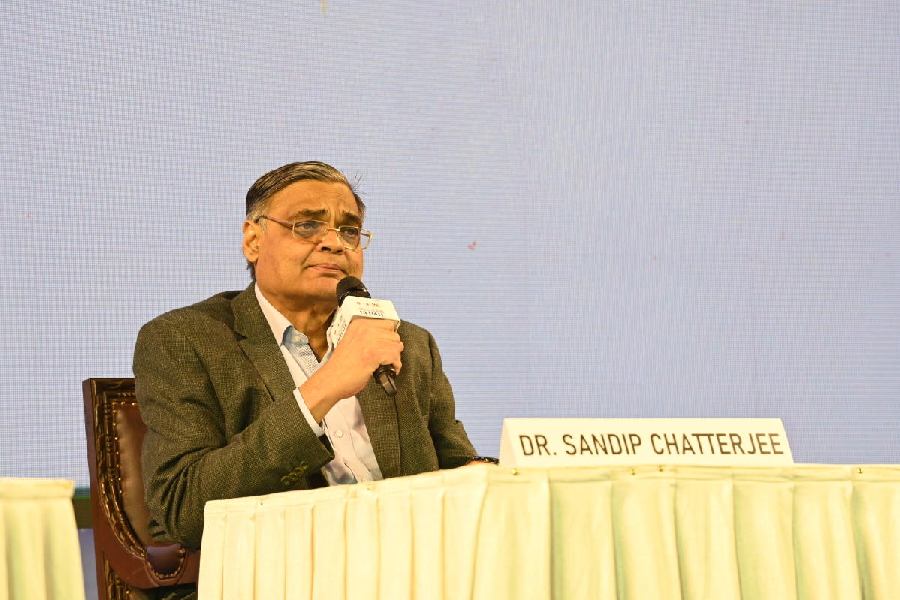It was an ordinary dawn. Or so I thought, and then the phone rang. “We lost Sandip.”
Sandip Chatterjee, who died in Calcutta on Monday aged 63, was a renowned neurosurgeon, charismatic speaker, poet, the sharpest knife in the drawer, philanthropist, generous friend, photographer of the great outdoors, and wildlife, and a loyal and supportive upholder of the rights of women.
He was a Xaverian who was popular and humble, and was a fine scholar. He received his MBBS degree in 1984 with honours in surgery and ophthalmology followed by an FRCS from Edinburgh in 1989 and FRCS in neurosurgery in 1994. His litany of affiliations to professional societies is long and weighty, and he was published in 138 journals and was on the board of six journals.
The first of the titans of our contemporaries has fallen. A friend and colleague on the floor at many intercollegiate competitions of debaters, Sandip Chatterjee was a sparring partner before I left the country, for thirty-eight years, to follow my destiny as a journalist first, and then an academic in Toronto.
Typically largehearted and expansive in his friendships, in our meetings over the years he never forgot to take time out to commiserate and empathise when my mother passed on. Dr Sandip Chatterjee, one of Calcutta’s foremost neurosurgeons, is survived by his twin Dipanyita, father Dr Subir Chatterjee and his brother Dr Sudip Chatterjee and his son Sambit Chatterjee, his wife Uttara and daughter-in-law, all from the medical fraternity.
He never forgot to remind me with a twinkle in his eye that his father and mine were buddies in London in the ‘50s, pursuing their surgery fellowships at the same time.
“That gives us a shared history,” he told me often. But that’s not all we shared. Often at gatherings, he would quietly appear out of nowhere, and would declare in sotto voce “Now, don’t drink too much of that nectar, white wine is dangerous for you, m’lady with high sugar.”
Actually, he loved his chilled glass of white sauvignon blanc, perhaps more than I.
He was a man who turned heads at meetings, not just by his personality and his style, but by his command of the English language and his nimble sense of humour.
Recently, at a scientific talk, I recall him saying: “Asking a professor of brain surgery to talk about imagination is like asking your hairdresser at the salon to talk about the brain. We have proximity but no depth of knowledge nor knowledge of depth.”
His formidable presence at six foot plus in a room was made all the more formidable when none dared cross the boundaries of justice and fair play. I served on
the Library Committee
of The Bengal Club, in his team, and watched the
efficacy and brevity with which he chaired the meetings.
He will be remembered by many for encouraging the idea of the first book club in the city when he worked with the then president of The Bengal Club, Ambarish Dasgupta, who suggested to this writer to launch the book club so members would participate through the terrifying Covid years.
A connoisseur of good food, Sandip will always bring a smile and a tear with his kind words whenever he tasted my cooking: “How can we fault your passion to cook and feed when you create such mouth-watering delicacies.”
Ever the largehearted doctor, he healed with the gentlest food to the brain -- the kindest of words was his brand of medicine. I recall a poignant poem he had sent me which he had composed on the death of a dear friend’s mother, who died in Sandip’s nursing home due to Covid.
Those lines ironically light up the night sky today, where he must be looking down on us, in his poem Darkness and Light, published in the International Journal of Neurology, December 2021.
“They listened not to what you had said they trampled on what you had read
They left you midst the dying and dead
For you were just a doctor”.
Julie Banerjee Mehta is an academic and author










